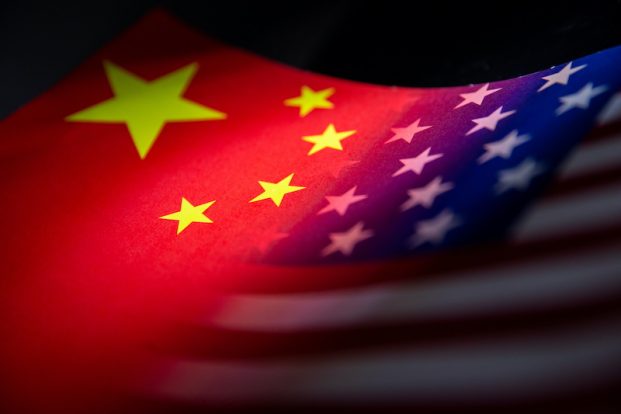A review by lawmakers in the US Congress of Chinese stock holdings in BlackRock funds based on MSCI indexes could lead to a broad clampdown on US investment in such shares, analysts say.
US institutional investment could be hit, they say, because Washington fears American money may help Beijing gain military or technological advantages.
Relations between the two countries are at a low point amid friction on issues including Taiwan and the Ukraine war.
The Biden administration is weighing new restrictions on outbound private investment in China on top of existing bans on certain technology sales and other trade measures.
ALSO SEE: China, Saudi Seen in Talks for ETF Cross-Listings to Boost Ties
Companies ‘tied to rights abuses, or military’
A US congressional committee said earlier this week that BlackRock and index provider MSCI were facilitating investments in companies that Washington has tied to Chinese human rights abuses or its military.
The House of Representatives’ Select Committee on the Chinese Communist Party sent detailed questions about how the Chinese shares came to be included in products like BlackRock’s iShares MSCI Emerging Markets exchange-traded fund.
The committee has also questioned other companies over their China ties, and analysts said more such reviews and increased restrictions on US investing in Chinese shares were likely.
For institutional investors, China, as the world’s second-largest economy, is an important component in international portfolios and indexes. Chinese companies including Tencent and Alibaba accounted for 31% of the MSCI Emerging Markets index in July.
16 firms offering US funds with Chinese companies
“I’m telling (clients) to expect more and stronger actions prohibiting or making it more difficult to invest in China, and greater scrutiny of those investments,” Jo Ritcey-Donohue, an attorney who advises institutional investors, said.
“As long as all these cross-border tensions are out there, there’ll continue to be pressure on US businesses.”
BlackRock said on Tuesday it is one of 16 asset managers offering US index funds holding Chinese companies. It said it complies with all US laws and will engage with the select committee.
MSCI said it is reviewing the committee’s inquiry.
‘Guardrails on US capital’
The degree to which Western capital enables authoritarian regimes has been a long-simmering issue, intensified by a rush of money into low-cost index funds.
Committee chair Mike Gallagher has said the US companies were not doing anything illegal but that Congress needs to close loopholes.
In an interview on Thursday, Gallagher said he is not calling “for a complete cut-off of our economic relationship with China.” But he said the committee is debating “this question of guardrails on outbound capital flows.”
His committee can make policy recommendations, and a hard line toward China has bipartisan support.
Todd Rosenbluth, head of research for financial analysis firm VettaFi, said while BlackRock and MSCI are the most prominent firms in the index-investment space, new laws or regulations that emerge from the probe also would likely apply to competing products such as the Vanguard FTSE Emerging Markets ETF.
“If the end result of this investigation are rules that say that index providers need to exclude certain China-based companies, then those rules would apply to others” across the industry, Rosenbluth said.
Red-flagged companies
MSCI and rivals removed seven Chinese companies from global indexes in 2020 because of US ownership restrictions. After Russia’s invasion of Ukraine last year MSCI and FTSE Russell removed Russian equities from all their indexes.
The committee’s letters this week cited contractors to China’s People’s Liberation Army it identified in BlackRock funds or MSCI indexes.
Some of the companies have been flagged such as appearing on the US Treasury’s “Chinese Military-Industrial Complex” companies list. For companies on it, US persons and asset managers face purchase and sale restrictions but not divestment requirements.
Also, a number of those companies’ subsidiaries are still eligible for US investment, at least for now, according to Ritcey-Donohue, even if they are subject to other sanctions like the Department of Commerce’s Military End User list that restricts certain trade with these entities.
- Reuters with additional editing by Jim Pollard
ALSO SEE:
BlackRock Slashes Monthly Fees for China Funds – Ignites Asia
BlackRock to Manage Project Outside Beijing – Mingtiandi
BlackRock CEO says Ukraine War May Accelerate Digital Currencies
BlackRock Seen Planning First China ETF Product This Year
























